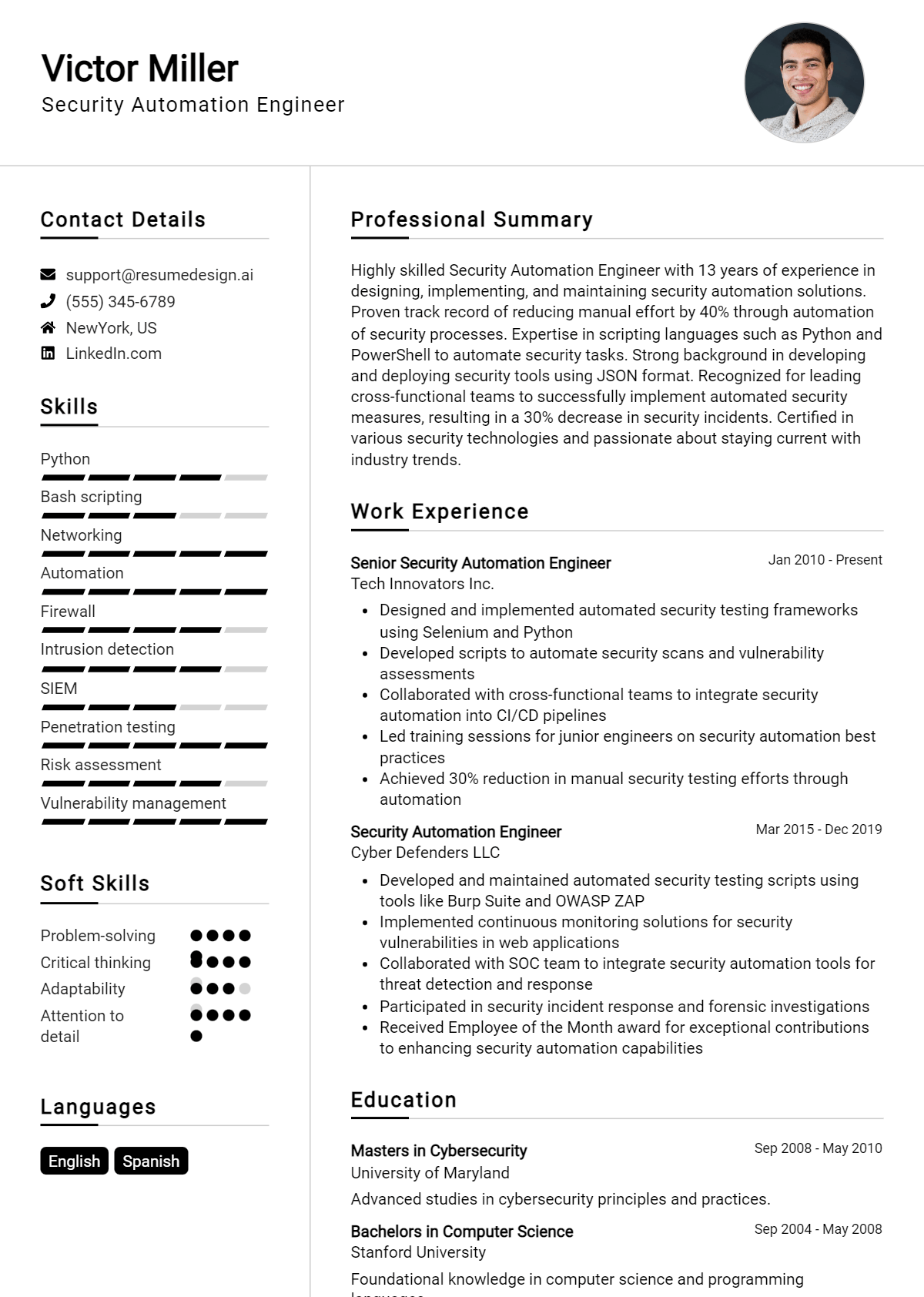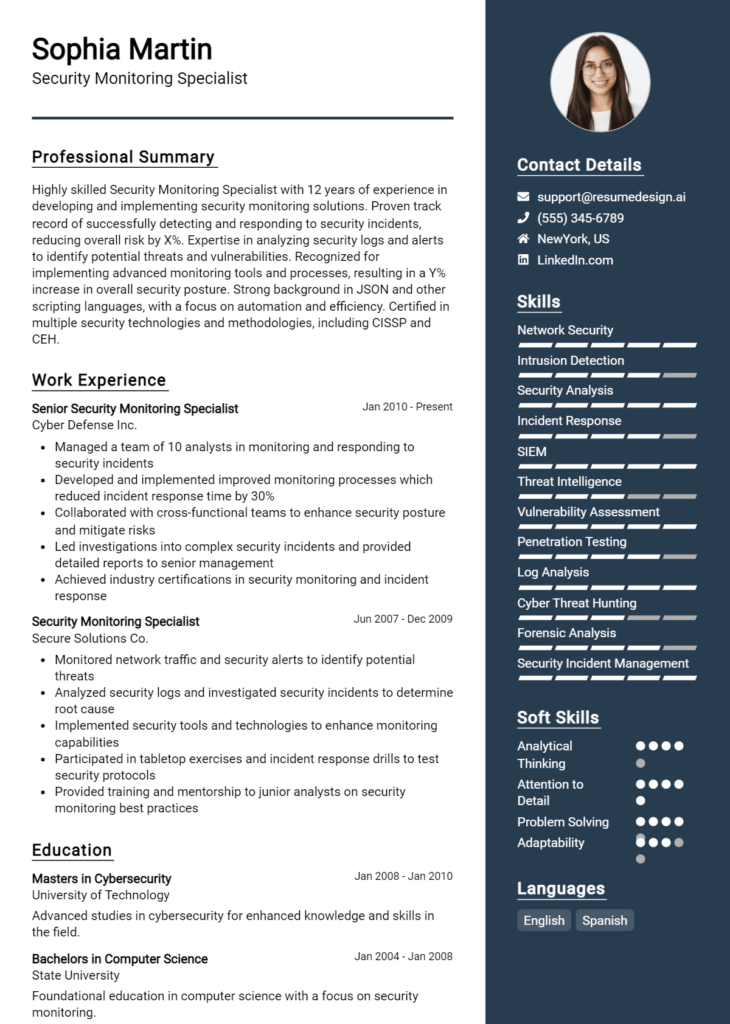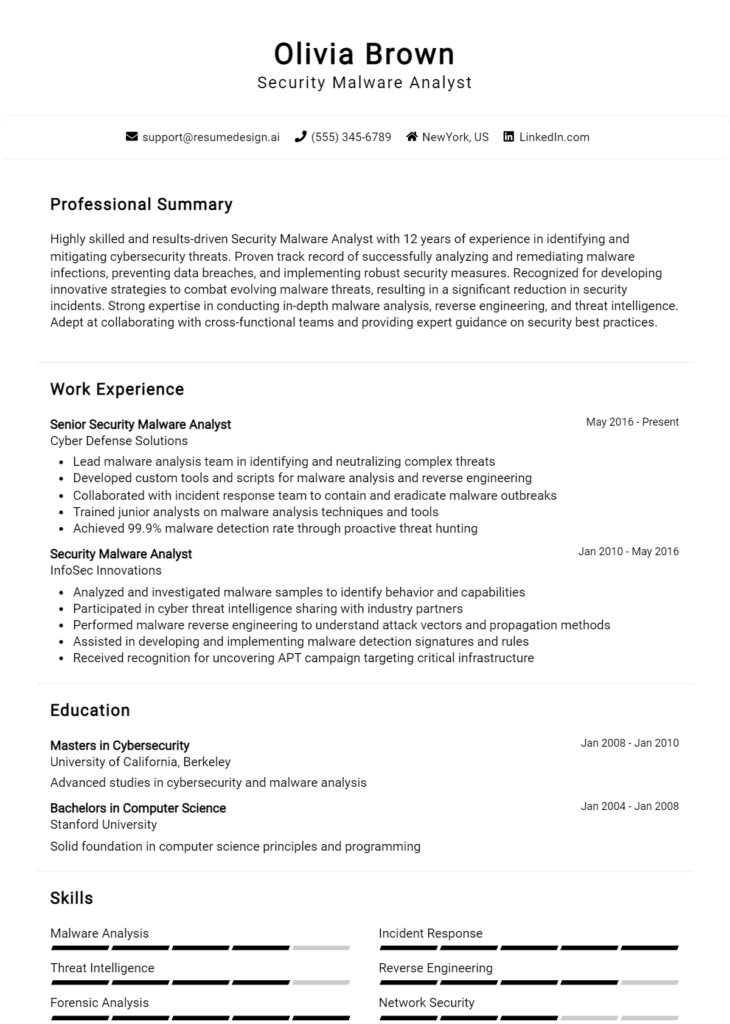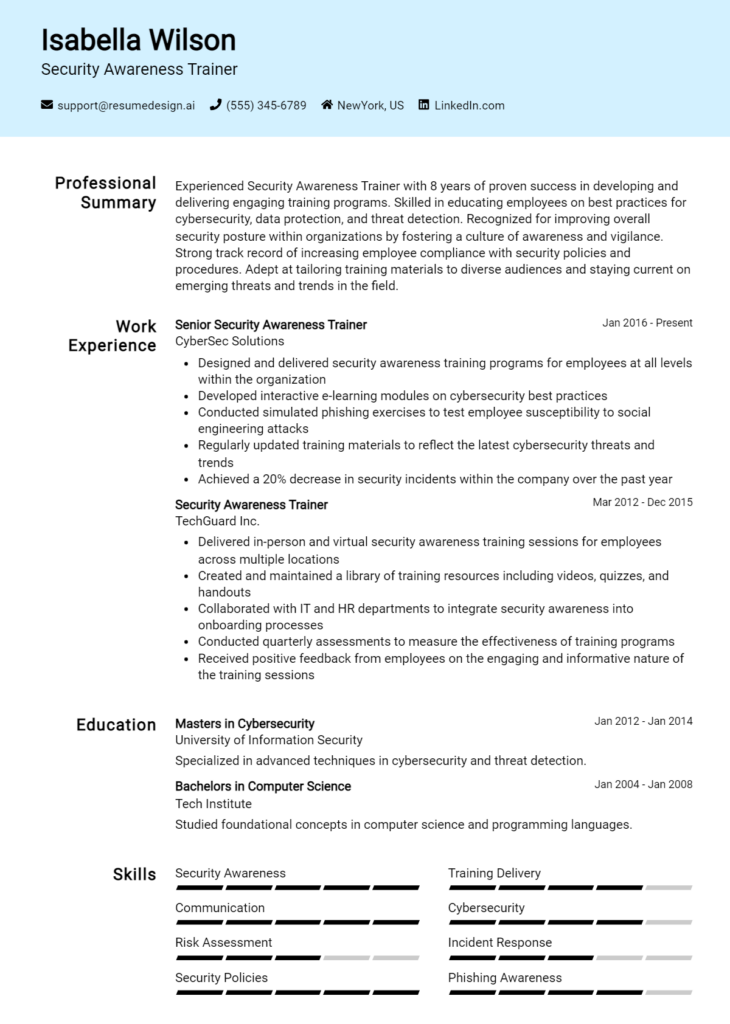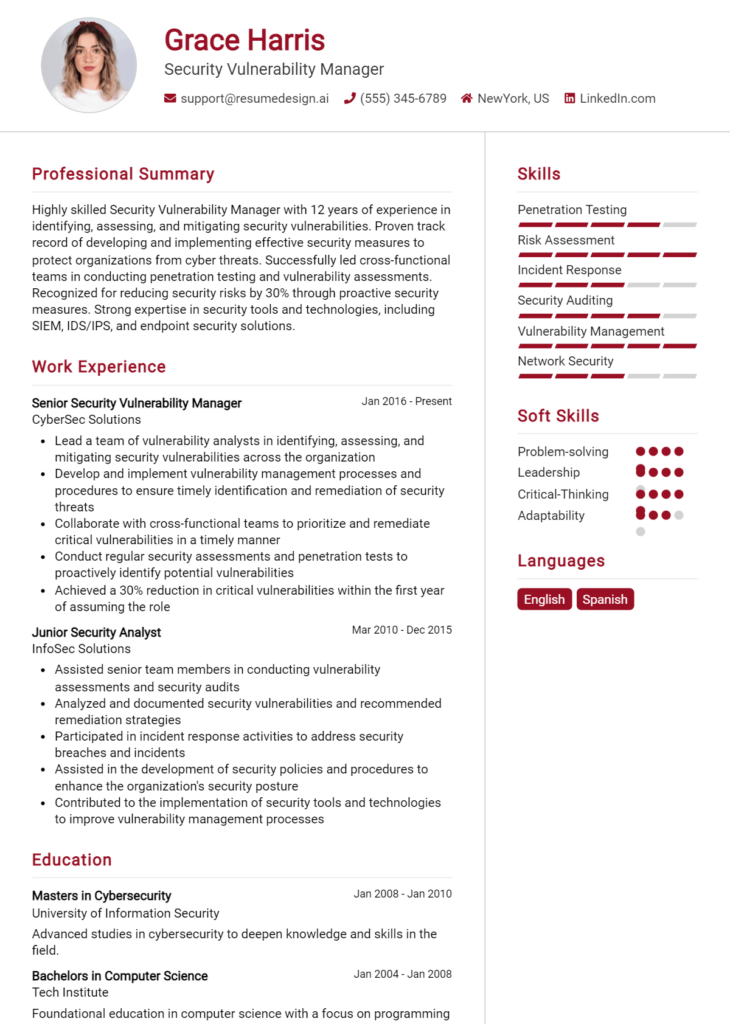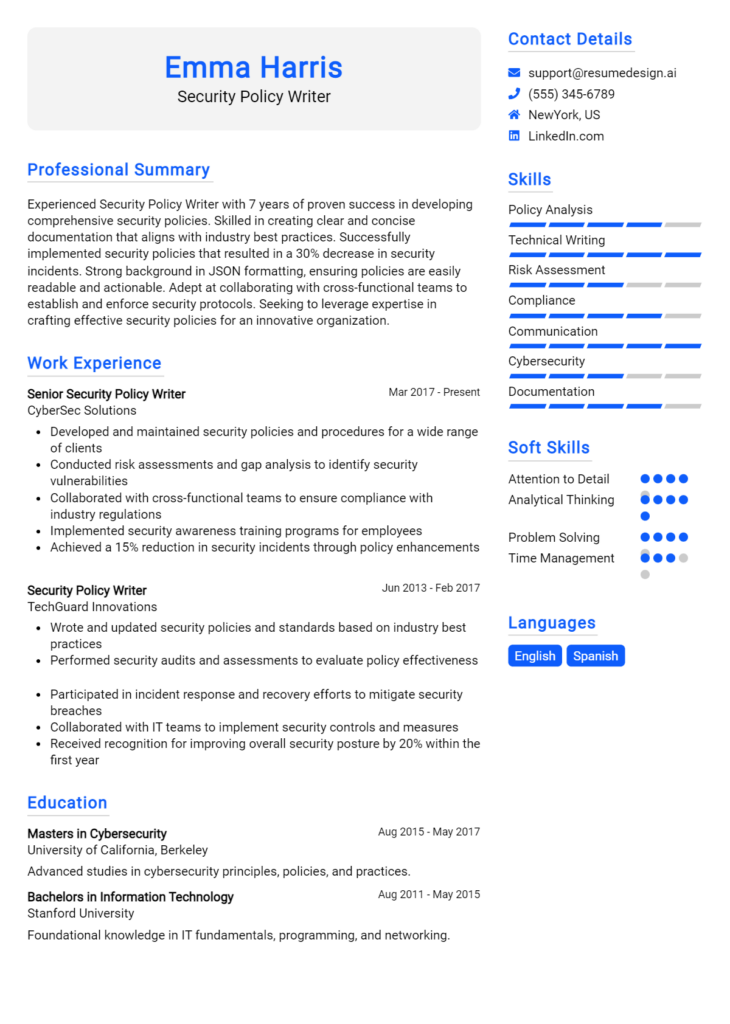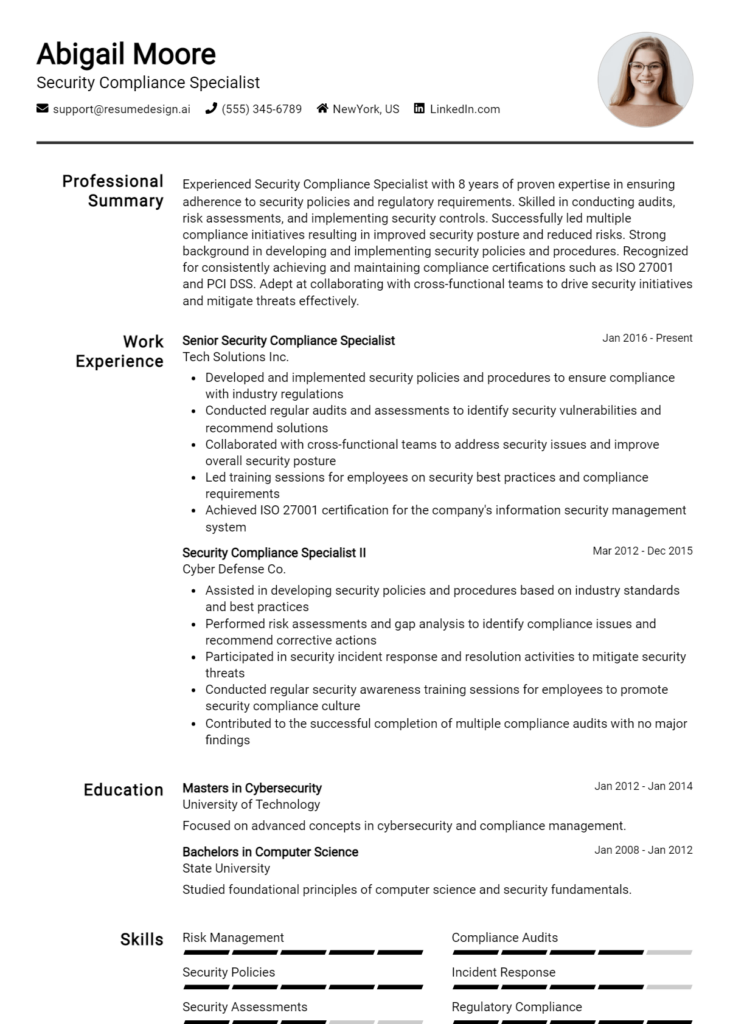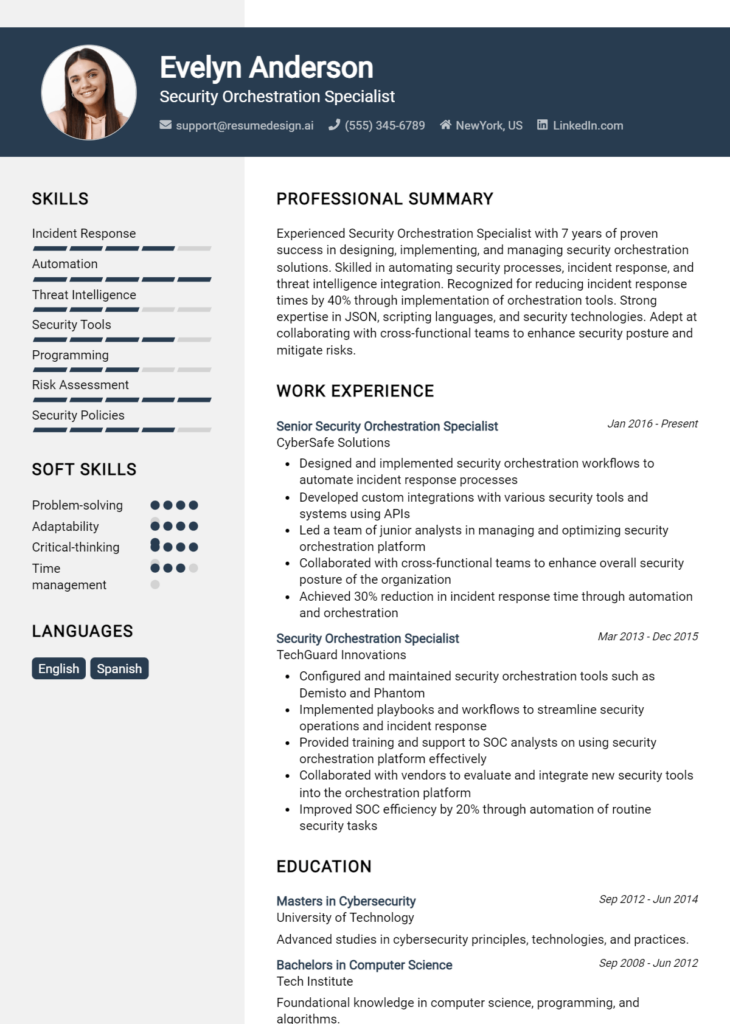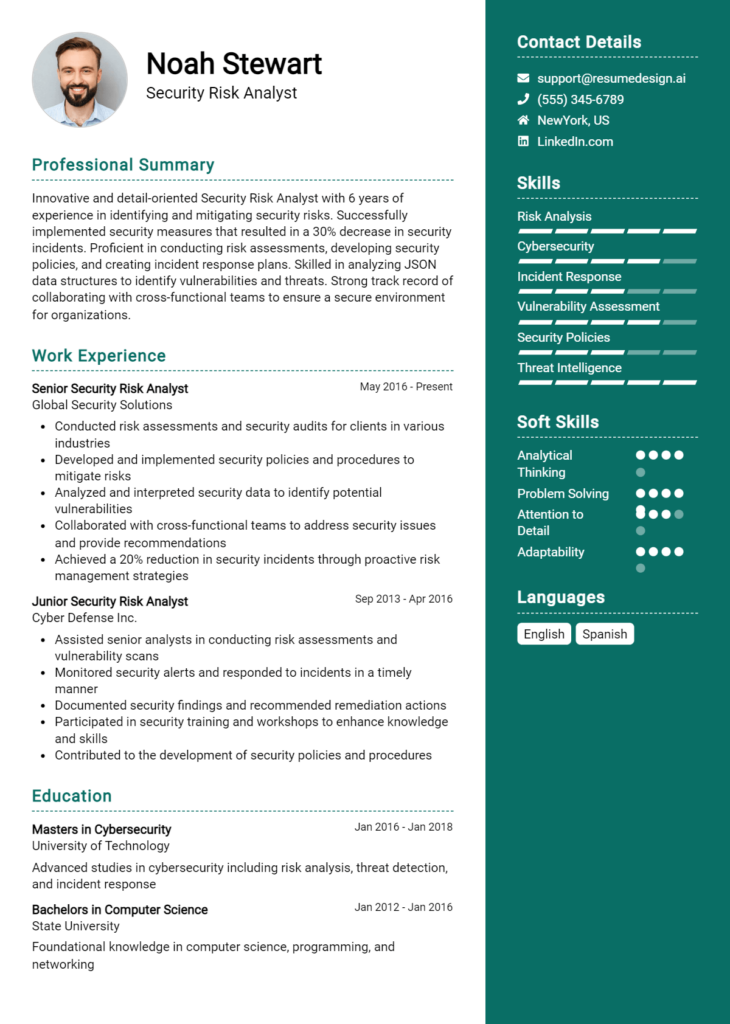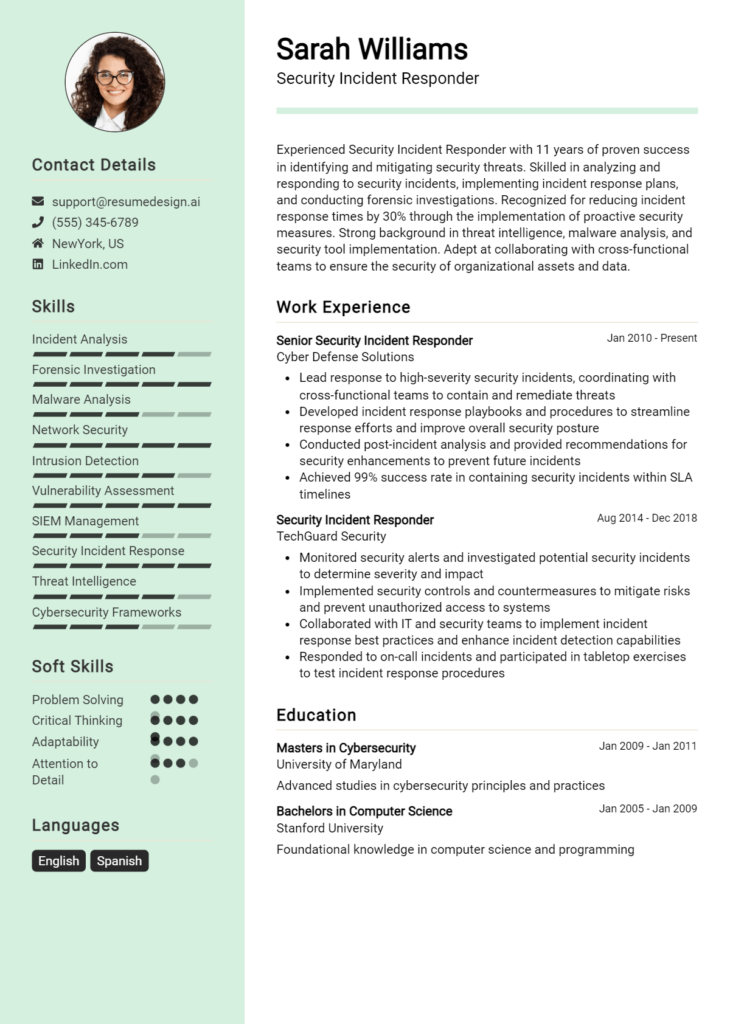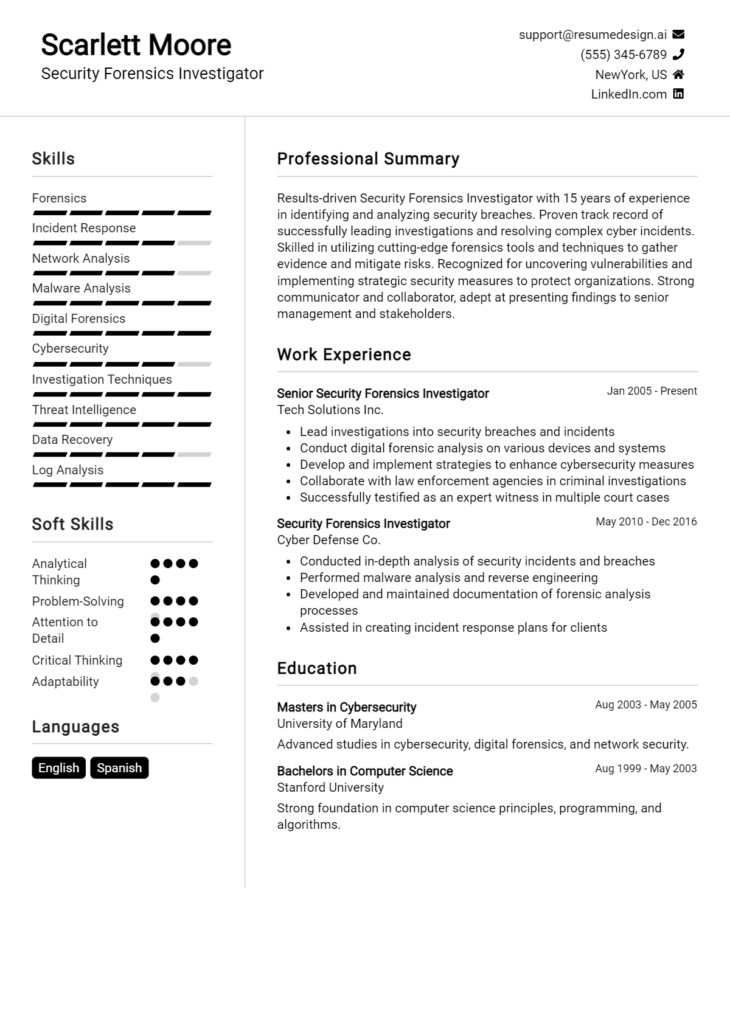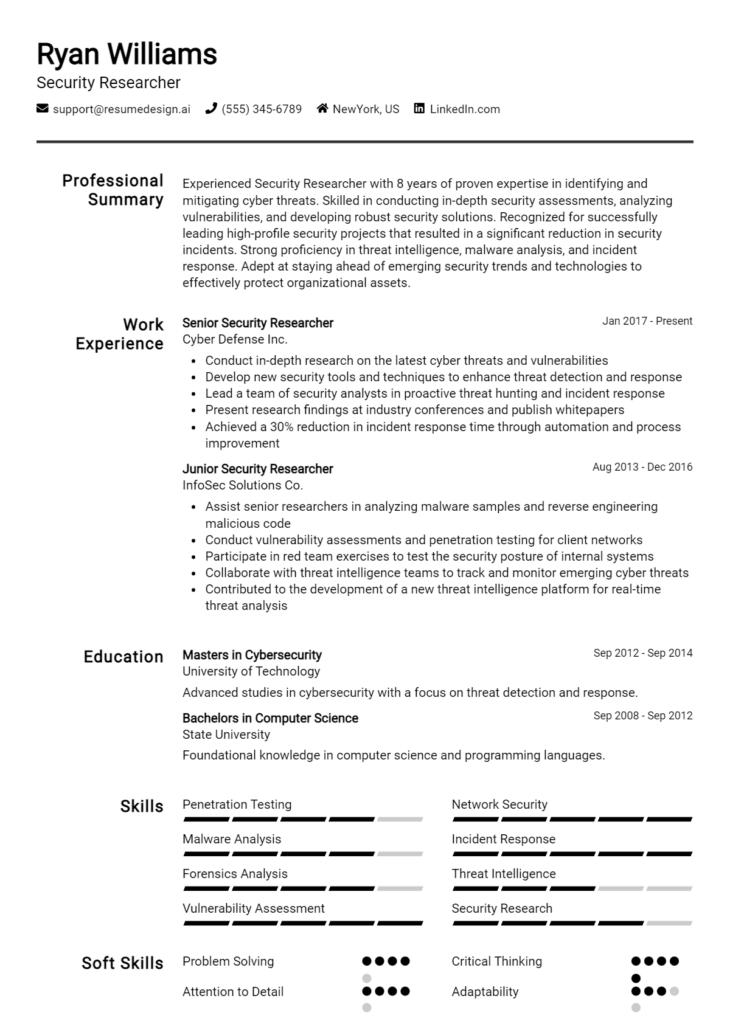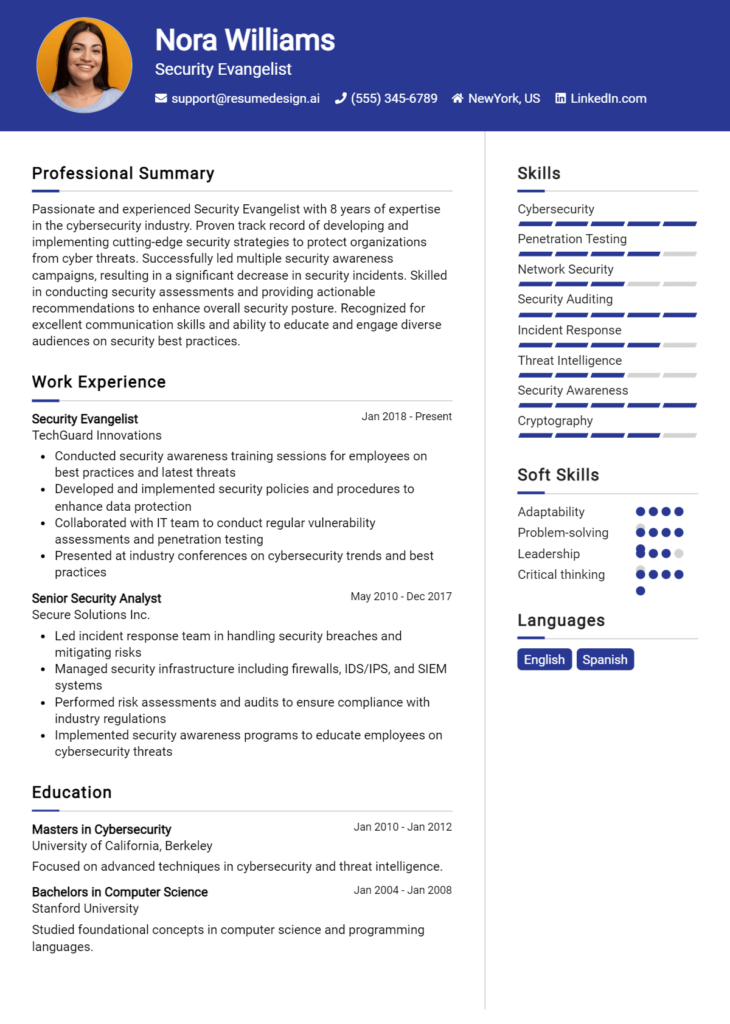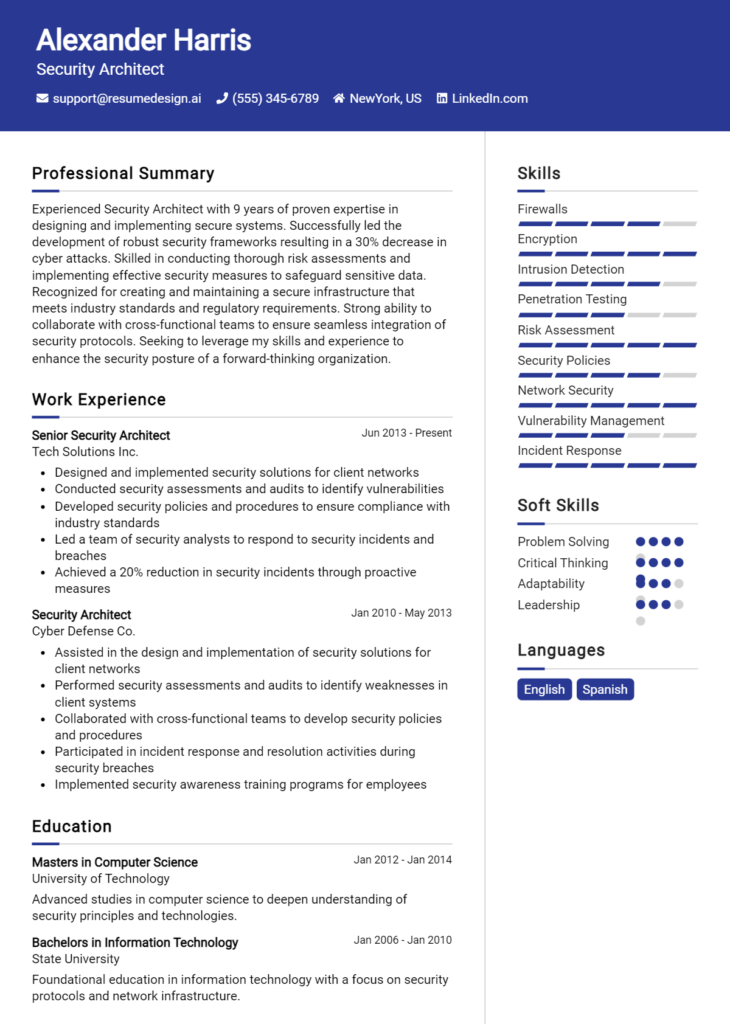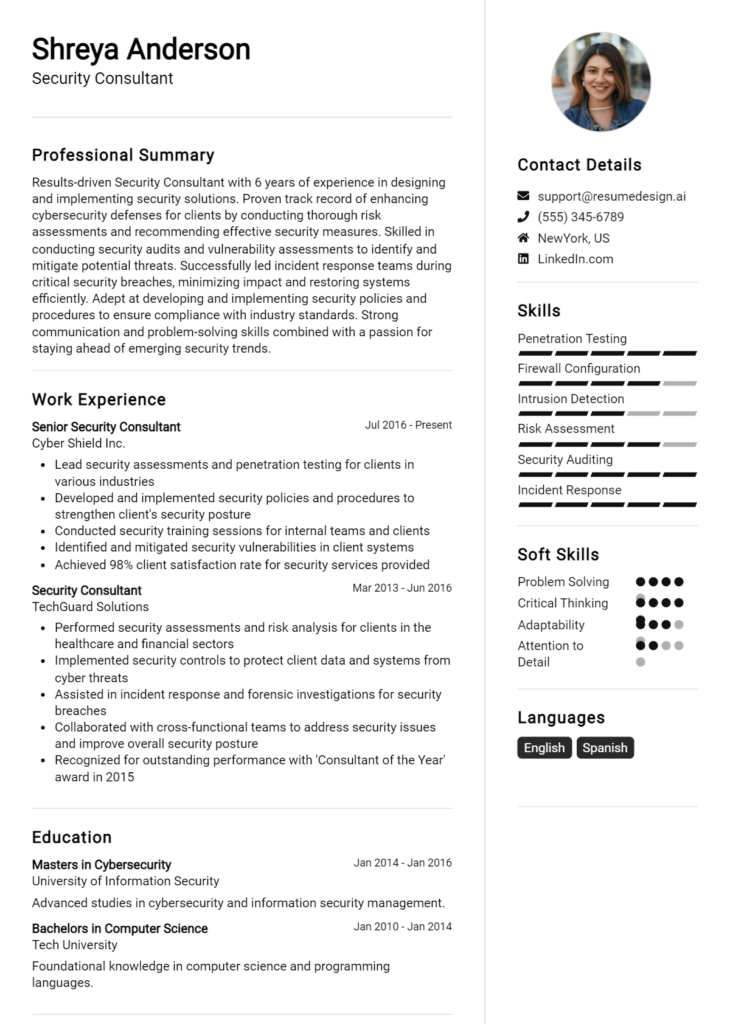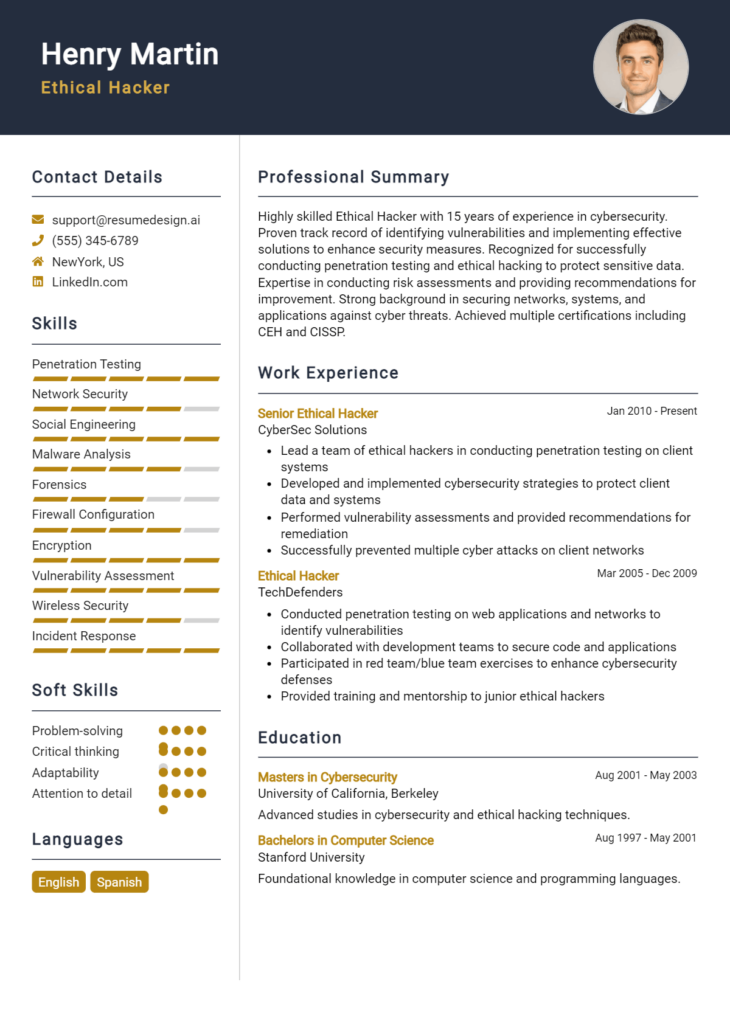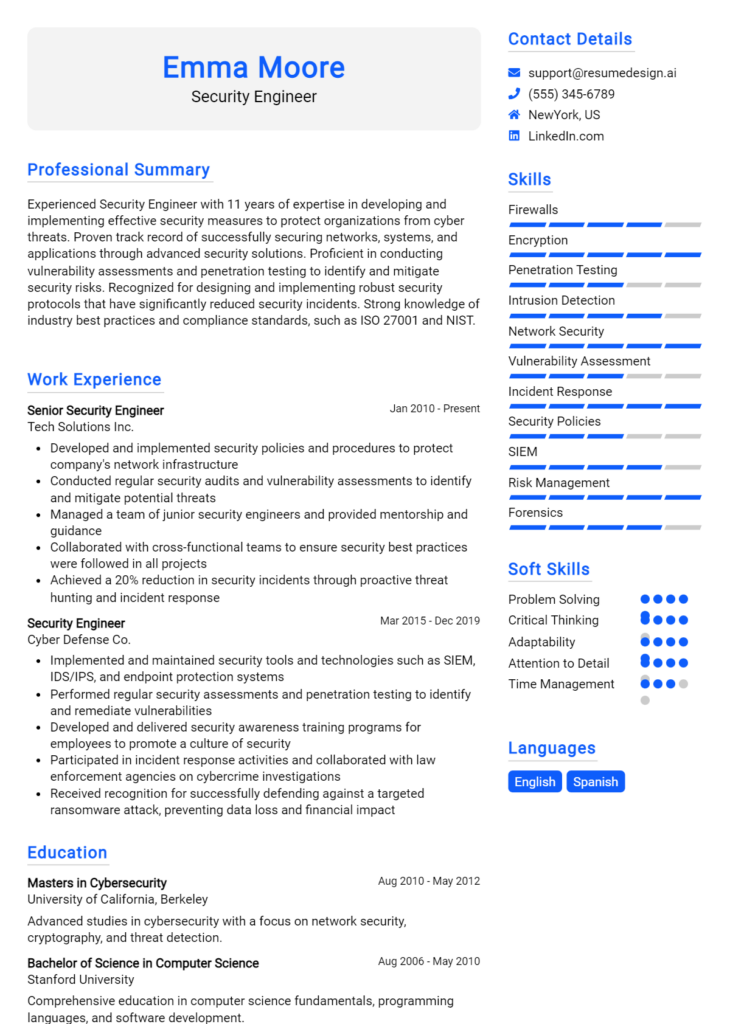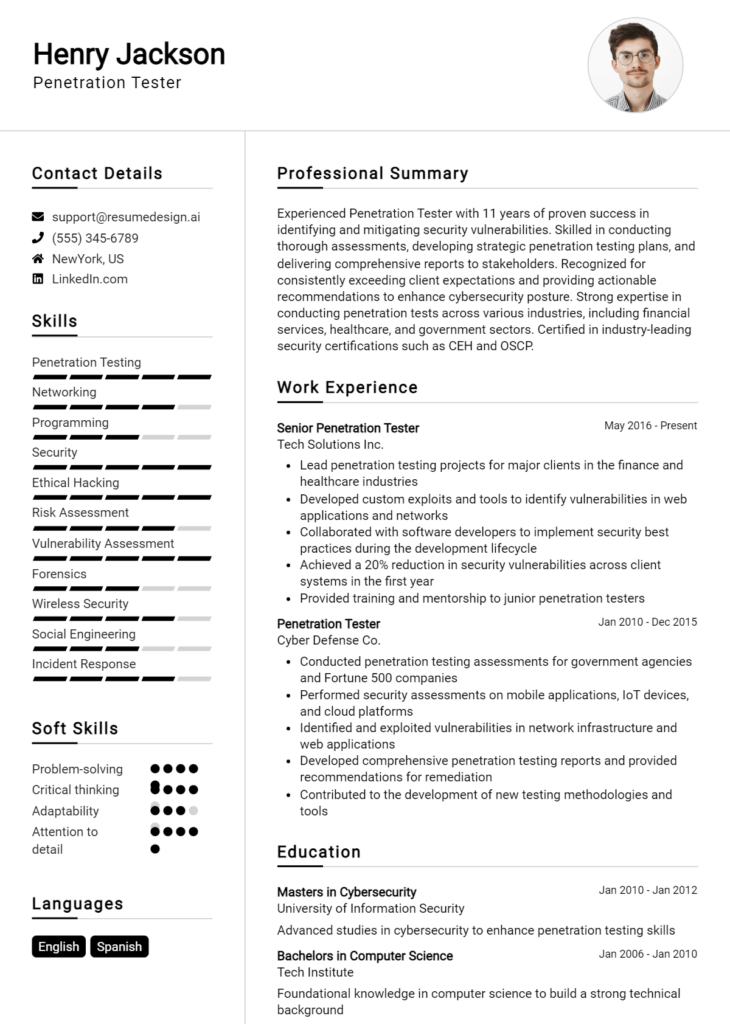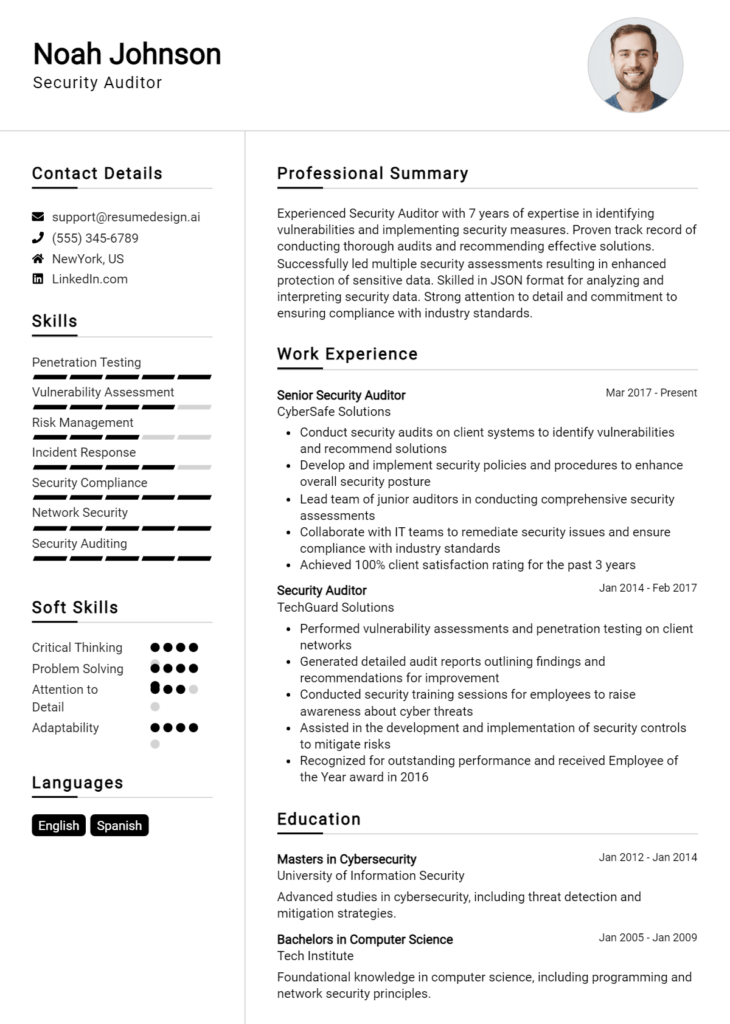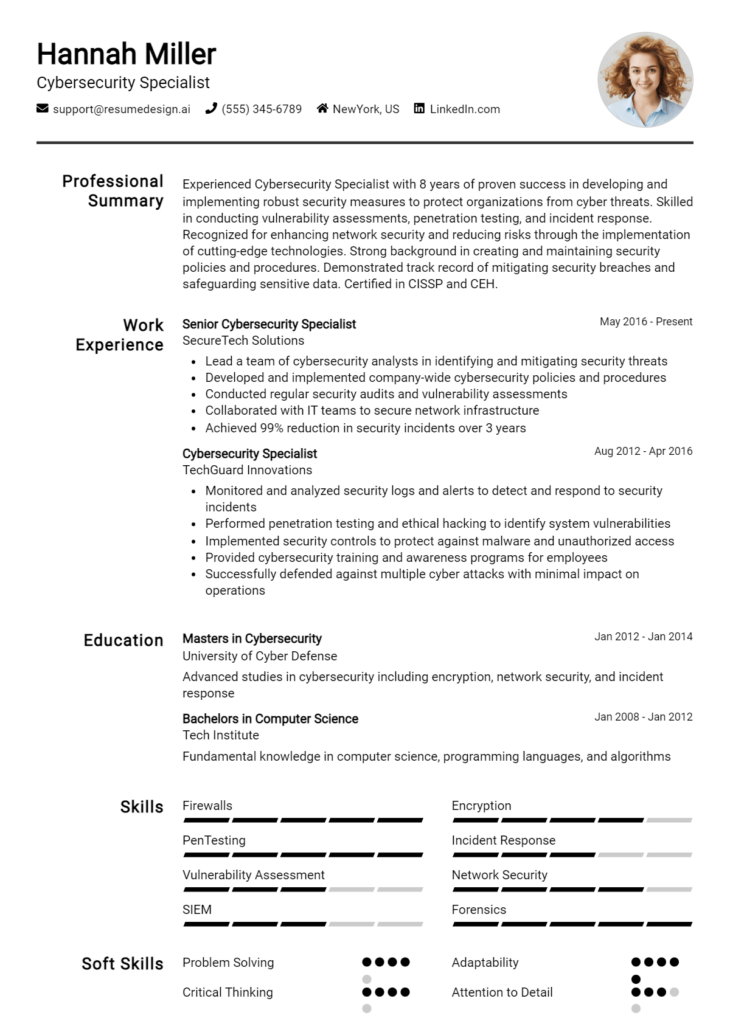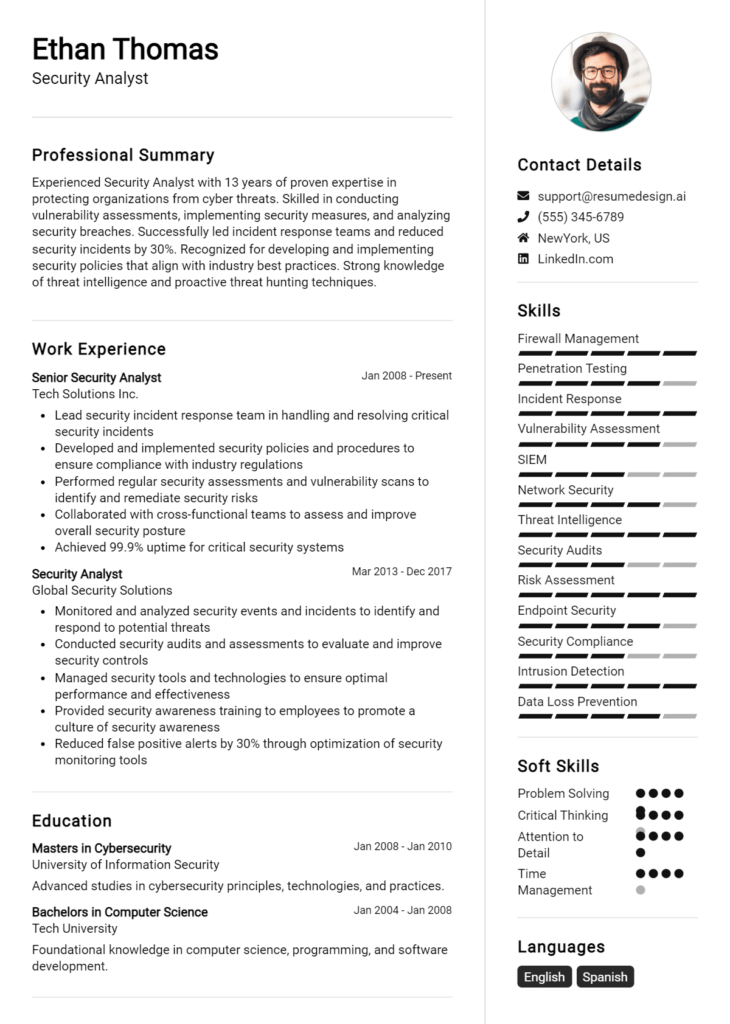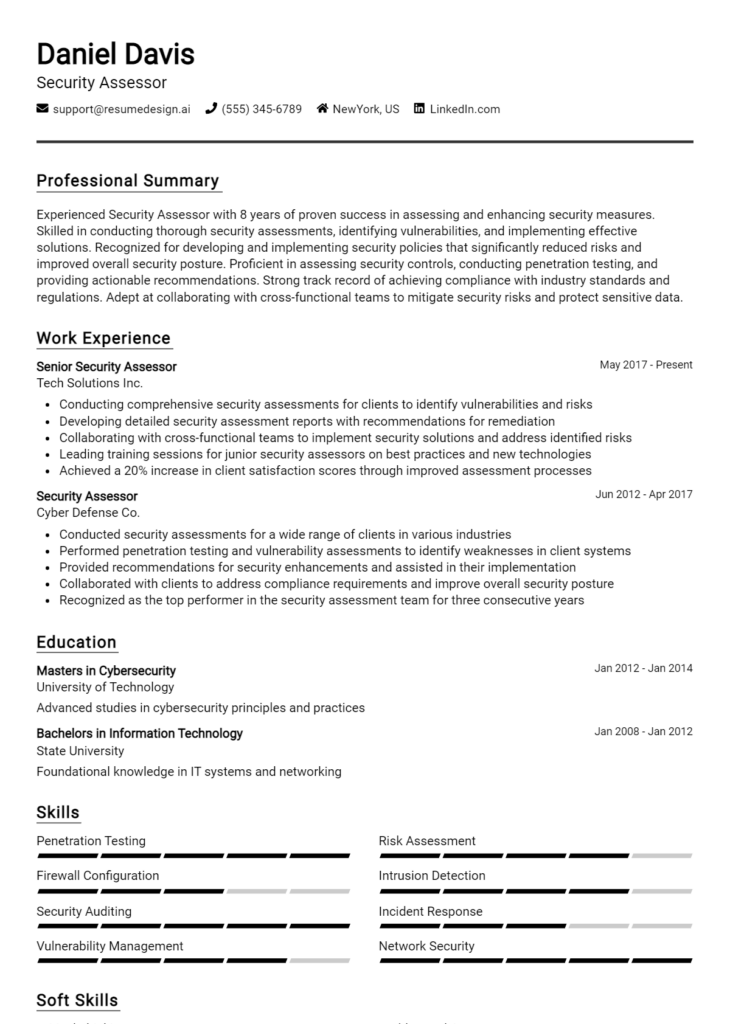Security Automation Engineer Core Responsibilities
A Security Automation Engineer plays a pivotal role in enhancing an organization's cybersecurity posture by automating security processes and tools. This professional must possess strong technical skills in scripting and programming, operational knowledge of security frameworks, and exceptional problem-solving abilities. By bridging IT and security departments, they facilitate seamless communication and collaboration, ensuring that security measures align with business objectives. A well-structured resume can effectively showcase these qualifications, highlighting the engineer's impact on the organization’s overall goals.
Common Responsibilities Listed on Security Automation Engineer Resume
- Develop and implement automation scripts for security tools and processes.
- Monitor and analyze security incidents to identify automation opportunities.
- Collaborate with IT and DevOps teams to integrate security into CI/CD pipelines.
- Maintain and enhance security monitoring and alerting systems.
- Conduct vulnerability assessments and automate remediation processes.
- Document security automation workflows and procedures.
- Stay updated on emerging security technologies and best practices.
- Provide training and support to teams on automation tools and processes.
- Participate in incident response activities and post-mortem reviews.
- Evaluate and recommend security tools that support automation initiatives.
- Develop metrics and reporting for automated security operations.
High-Level Resume Tips for Security Automation Engineer Professionals
In today's competitive job market, a well-crafted resume is crucial for Security Automation Engineer professionals. Often, it serves as the first impression a candidate makes on potential employers, making it essential to present a document that effectively reflects their skills and achievements. A resume that highlights relevant experience and demonstrates a strong understanding of security automation concepts can set a candidate apart from the crowd. This guide will provide practical and actionable resume tips specifically tailored for Security Automation Engineer professionals, ensuring that your application stands out and captures the attention of hiring managers.
Top Resume Tips for Security Automation Engineer Professionals
- Tailor your resume to match the job description by using keywords and phrases that reflect the requirements outlined by the employer.
- Showcase relevant experience, focusing on positions where you implemented security automation solutions or worked with related technologies.
- Quantify your achievements by using metrics to demonstrate the impact of your work, such as reduced incident response times or increased system efficiencies.
- Highlight industry-specific skills, such as familiarity with security frameworks, coding languages, and automation tools relevant to security operations.
- Include certifications that validate your expertise, such as Certified Information Systems Security Professional (CISSP) or Certified Ethical Hacker (CEH).
- Use clear and concise language to describe your responsibilities and accomplishments, avoiding jargon that may not be universally understood.
- Incorporate a summary statement at the top of your resume that encapsulates your experience and career goals in the field of security automation.
- Utilize bullet points for easy readability, making it simple for hiring managers to scan your resume for key information.
- Ensure your resume is visually appealing and free from errors by using consistent formatting and proofreading for typos or grammatical mistakes.
By implementing these tips, Security Automation Engineer professionals can significantly increase their chances of landing a job in this specialized field. A well-structured resume that effectively communicates qualifications and achievements will resonate with hiring managers, making it more likely for candidates to secure interviews and advance in their careers.
Why Resume Headlines & Titles are Important for Security Automation Engineer
In the competitive field of cybersecurity, the role of a Security Automation Engineer is pivotal in safeguarding an organization’s digital assets. A well-crafted resume is essential for candidates vying for this position, and a strong resume headline or title serves as the first point of contact with hiring managers. A compelling headline can immediately capture attention and succinctly summarize a candidate's key qualifications, skills, and experiences relevant to the job. By distilling one’s professional identity into a concise and impactful phrase, candidates can effectively set themselves apart from the competition and encourage hiring managers to delve deeper into their resumes.
Best Practices for Crafting Resume Headlines for Security Automation Engineer
- Keep it concise: Aim for clarity and brevity, ideally within 10 words.
- Be role-specific: Tailor the headline to reflect the Security Automation Engineer position.
- Highlight key skills: Focus on essential skills such as automation tools, scripting languages, or security protocols.
- Use impactful language: Choose strong action verbs and descriptive adjectives to convey expertise.
- Avoid jargon: While industry terms can be useful, ensure the language is accessible to all hiring managers.
- Include certifications: Mention relevant certifications or qualifications if they enhance your candidacy.
- Showcase accomplishments: Reflect on significant achievements that demonstrate your capabilities.
- Align with the job description: Use keywords from the job posting to make your resume more relevant.
Example Resume Headlines for Security Automation Engineer
Strong Resume Headlines
"Certified Security Automation Engineer with 5+ Years of Experience in Scripting and Tool Integration"
“Expert in Cybersecurity Automation and Threat Detection with Proven Results in Reducing Incident Response Time”
“Dynamic Security Automation Specialist with a Focus on Continuous Improvement and Risk Mitigation”
Weak Resume Headlines
“Experienced IT Professional"
“Looking for a Job in Security”
The strong headlines are effective because they are specific, detailed, and highlight the candidate's unique strengths and qualifications in the field of security automation. They utilize industry-relevant terminology and focus on measurable achievements, which can resonate with hiring managers looking for expertise. In contrast, the weak headlines fail to impress because they are vague and lack specificity, offering little insight into the candidate’s qualifications or suitability for the role. They do not convey a sense of purpose or value, making it difficult for recruiters to see why the candidate stands out in a crowded job market.
Writing an Exceptional Security Automation Engineer Resume Summary
A resume summary is a critical component for a Security Automation Engineer as it serves as the first impression to hiring managers. An exceptional summary succinctly encapsulates the candidate's key skills, relevant experience, and notable accomplishments, allowing them to stand out in a competitive job market. It should be impactful and tailored specifically to the job at hand, ensuring that it quickly captures attention and demonstrates the candidate's alignment with the organization's needs.
Best Practices for Writing a Security Automation Engineer Resume Summary
- Quantify Achievements: Use specific numbers to highlight your contributions and successes.
- Highlight Relevant Skills: Focus on technical skills and tools that are relevant to security automation.
- Tailor to the Job Description: Customize your summary to reflect the specific requirements of the job you are applying for.
- Be Concise: Keep your summary brief, ideally within 2-4 sentences.
- Use Action Verbs: Start sentences with strong action verbs to convey your impact effectively.
- Showcase Certifications: Mention relevant certifications that enhance your qualifications.
- Demonstrate Problem-Solving: Include examples of how you have addressed security challenges in previous roles.
- Incorporate Keywords: Use industry-specific keywords to improve visibility in applicant tracking systems.
Example Security Automation Engineer Resume Summaries
Strong Resume Summaries
Results-driven Security Automation Engineer with over 5 years of experience in developing and implementing automated security solutions, achieving a 40% reduction in incident response times. Skilled in Python, Ansible, and various SIEM tools, with a proven track record of enhancing security postures for Fortune 500 companies.
Dedicated Security Automation Engineer adept at integrating security tools and frameworks into CI/CD pipelines. Successfully engineered automated vulnerability scanning processes that decreased remediation time by 30%, ensuring compliance with industry standards and enhancing overall system security.
Innovative Security Automation Engineer with a strong background in threat detection and response automation. Spearheaded a project that automated the monitoring of network traffic, resulting in a 50% increase in threat detection efficiency and reducing false positives by 25%.
Weak Resume Summaries
Experienced engineer looking for a job in security automation. I have worked in various IT roles and have some knowledge of security tools.
Security professional with a background in automation and engineering. I am seeking to leverage my skills in a challenging role.
The strong resume summaries effectively demonstrate the candidate's ability to deliver quantifiable results and specific skills relevant to the Security Automation Engineer role. They highlight achievements and expertise in a concise manner, making them more appealing to hiring managers. In contrast, the weak summaries lack detail, quantifiable outcomes, and fail to convey a clear picture of the candidate's qualifications, making them less impactful and memorable.
Work Experience Section for Security Automation Engineer Resume
The work experience section of a Security Automation Engineer resume is pivotal as it provides a comprehensive overview of the candidate's technical capabilities, leadership qualities, and ability to produce high-quality results. This section not only highlights the specific tools and technologies the candidate has mastered but also illustrates their capacity to manage teams and projects effectively. By quantifying achievements and aligning past experiences with industry standards, candidates can distinctly showcase their value and readiness to tackle the challenges of the role.
Best Practices for Security Automation Engineer Work Experience
- Focus on relevant technical skills, such as programming languages, security tools, and automation frameworks.
- Quantify achievements using metrics, such as percentage improvements in security posture or time saved through automation.
- Highlight leadership roles in projects or teams to demonstrate your ability to guide and mentor others.
- Use action verbs to convey a sense of initiative and impact, such as "developed," "implemented," and "optimized."
- Align your experience with industry standards and best practices to show familiarity with current methodologies.
- Include collaborative projects that showcase teamwork and communication skills, essential in security environments.
- Tailor your work experience to match the job description, emphasizing the most relevant roles and achievements.
- Maintain clarity and conciseness in descriptions to ensure easy readability and comprehension by hiring managers.
Example Work Experiences for Security Automation Engineer
Strong Experiences
- Led a team of 5 engineers in developing an automated threat detection system that reduced incident response time by 40%.
- Implemented a CI/CD pipeline with integrated security testing, resulting in a 30% increase in deployment frequency without compromising security.
- Designed and executed a vulnerability management program that decreased critical vulnerabilities by 70% within six months.
- Collaborated with cross-functional teams to deploy automated security policies, improving compliance metrics by 50% across the organization.
Weak Experiences
- Worked on various security projects and tasks.
- Assisted in implementing security measures.
- Participated in team meetings related to security automation.
- Helped improve systems and processes.
The examples labeled as strong experiences are effective because they are specific, quantify achievements, and demonstrate clear outcomes in terms of performance improvements and leadership. They convey a sense of initiative and the ability to contribute meaningfully to an organization. In contrast, the weak experiences lack detail and measurable results, making them unimpressive and less likely to capture the attention of hiring managers. They do not highlight the candidate's technical expertise or their impact on security operations, which is essential for a Security Automation Engineer.
Education and Certifications Section for Security Automation Engineer Resume
The education and certifications section in a Security Automation Engineer resume plays a crucial role in showcasing the candidate's academic background, industry-relevant certifications, and commitment to continuous learning. This section not only provides potential employers with insight into the applicant's foundational knowledge but also highlights specialized training and coursework pertinent to security automation. By including relevant degrees and certifications, candidates can significantly enhance their credibility and demonstrate alignment with the technical and analytical demands of the job role, making them more attractive to hiring managers.
Best Practices for Security Automation Engineer Education and Certifications
- Ensure that all listed degrees and certifications are relevant to the field of security automation.
- Include details such as the institution name, degree type, and graduation date for clarity.
- Highlight advanced certifications like CISSP, CISM, or specific automation tool certifications to emphasize expertise.
- Incorporate relevant coursework that demonstrates knowledge in security protocols, coding languages, and automation tools.
- List any specialized training or workshops attended that directly relate to security automation.
- Keep the descriptions succinct, focusing on the most impactful qualifications.
- Update the section regularly to reflect new certifications and courses undertaken.
- Consider organizing the section chronologically or by relevance to make it easy for hiring managers to review.
Example Education and Certifications for Security Automation Engineer
Strong Examples
- Master of Science in Cybersecurity, University of California, 2022
- Certified Information Systems Security Professional (CISSP), (ISC)², 2023
- Automation and Security Management, Coursera, Completed 2021
- Certified Ethical Hacker (CEH), EC-Council, 2023
Weak Examples
- Bachelor of Arts in English Literature, University of Texas, 2015
- Old CompTIA Security+ Certification, Expired 2020
- Basic Computer Skills Course, Local Community Center, 2016
- Certification in Microsoft Office Suite, 2019
The strong examples provided demonstrate a direct relevance to the role of a Security Automation Engineer, showcasing advanced degrees and certifications that reflect a commitment to the security field. In contrast, the weak examples highlight qualifications that lack relevance to the position, such as degrees in unrelated fields or outdated certifications that no longer contribute to the candidate's expertise in security automation. This distinction emphasizes the importance of aligning educational credentials with career objectives to enhance employability in the cybersecurity domain.
Top Skills & Keywords for Security Automation Engineer Resume
In today's digital landscape, the role of a Security Automation Engineer has become increasingly vital. Companies are continuously seeking professionals who can not only identify vulnerabilities but also automate security processes to enhance overall efficiency and effectiveness. A well-crafted resume that highlights the right skills can make a significant difference in capturing the attention of potential employers. By focusing on both hard and soft skills, candidates can showcase their technical expertise and interpersonal abilities, which are crucial for success in this role. For those looking to optimize their resumes, understanding the importance of these skills is imperative. For more on how to effectively list your skills and work experience, read on.
Top Hard & Soft Skills for Security Automation Engineer
Soft Skills
- Problem-solving
- Critical thinking
- Attention to detail
- Communication
- Collaboration
- Adaptability
- Time management
- Analytical thinking
- Creativity
- Leadership
Hard Skills
- Scripting languages (Python, Bash, PowerShell)
- Security frameworks (NIST, ISO 27001)
- SIEM tools (Splunk, ELK Stack)
- Vulnerability assessment tools (Nessus, Qualys)
- Network security protocols
- Incident response procedures
- Cloud security (AWS, Azure)
- Security automation tools (Ansible, Terraform)
- Threat modeling
- Risk assessment methodologies
Stand Out with a Winning Security Automation Engineer Cover Letter
Dear [Hiring Manager's Name],
I am writing to express my interest in the Security Automation Engineer position at [Company Name], as advertised on [where you found the job posting]. With a robust background in cybersecurity, automation, and system engineering, I am excited about the opportunity to contribute to your team and enhance your security posture through innovative automation solutions. My experience in developing automated security controls and incident response mechanisms aligns well with the requirements of this role.
In my previous position at [Previous Company Name], I successfully led a project to automate threat detection and response processes, which resulted in a 40% reduction in response time to security incidents. I utilized tools such as Python and Ansible to create scripts that integrated with existing security frameworks, streamlining operations and enabling the security team to focus on more complex threats. My expertise in leveraging SIEM tools and developing custom alerts has equipped me with the skills necessary to proactively identify vulnerabilities and mitigate risks before they escalate.
I am particularly drawn to [Company Name] because of your commitment to innovation and security excellence. I am eager to bring my passion for automation and my technical skills in security engineering to your organization. I am confident that my problem-solving abilities and collaborative mindset will contribute positively to your team, helping to drive efficiency and enhance your security measures.
Thank you for considering my application. I look forward to the possibility of discussing how my background, skills, and enthusiasms align with the needs of your team. I am excited about the prospect of contributing to [Company Name] and am eager to bring my experience in security automation to help bolster your security initiatives.
Sincerely,
[Your Name]
[Your LinkedIn Profile or Contact Information]
Common Mistakes to Avoid in a Security Automation Engineer Resume
When applying for a position as a Security Automation Engineer, your resume serves as your first impression. It is crucial to present your skills and experiences clearly and effectively. However, many candidates make common mistakes that can hinder their chances of landing an interview. Here are some pitfalls to avoid when crafting your resume:
Generic Objective Statements: Using vague or generic objective statements does not highlight your specific skills or intentions. Tailor your objective to the role and company you are applying for.
Ignoring Relevant Skills: Failing to emphasize key skills such as programming languages, automation tools, and security frameworks can be detrimental. Ensure that your technical skills align with the job requirements.
Overloading with Jargon: While technical terminology is important, overloading your resume with jargon can make it difficult for recruiters to understand your qualifications. Use clear language to describe your experiences.
Lack of Quantifiable Achievements: Providing vague descriptions of your past roles without quantifiable achievements can weaken your resume. Include metrics or specific outcomes to demonstrate your impact.
Omitting Certifications: Security certifications (like CISSP, CEH, or Security+) are crucial in this field. Failing to list relevant certifications can make your resume less competitive.
Inconsistent Formatting: A resume with inconsistent formatting can be distracting and unprofessional. Stick to a clean, organized layout with uniform fonts and bullet points.
Neglecting Soft Skills: While technical skills are vital, soft skills such as teamwork, communication, and problem-solving are equally important. Highlighting these can set you apart from other candidates.
Not Tailoring for Each Job Application: Sending out a one-size-fits-all resume is a missed opportunity. Tailor your resume for each application to reflect the specific requirements and culture of the company.
By avoiding these common mistakes, you can create a more effective resume that showcases your qualifications and enhances your chances of securing a role as a Security Automation Engineer.
Conclusion
As we conclude our exploration of the role of a Security Automation Engineer, it's crucial to emphasize the importance of a well-crafted resume that highlights your skills and experiences in this rapidly evolving field. A Security Automation Engineer plays a vital role in enhancing an organization’s security posture through automated solutions, streamlining processes, and mitigating risks. Key skills often sought after in this role include proficiency in programming languages, familiarity with security frameworks, experience with automation tools, and a solid understanding of cybersecurity principles.
In addition to technical skills, showcasing your problem-solving abilities, teamwork experiences, and any certifications relevant to security automation can make your resume stand out to potential employers. Given the competitive nature of the job market, it’s essential to ensure that your resume not only reflects your qualifications but also aligns with industry standards.
Now is the perfect time to review your resume and make any necessary updates. Don’t forget to utilize available resources like resume templates, which can provide a professional layout; the resume builder, which simplifies the creation process; resume examples that can inspire your writing; and cover letter templates to complement your application. Take action today and enhance your chances of landing that coveted Security Automation Engineer position!

